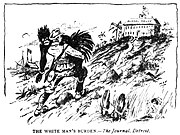IND/Education for Human Rights and Social Justice
Previously we learnt about human rights, and international mechanisms to help protect and promote the human rights of all people. Education can also, however, play a vital role in “activating” human rights, as Newell and Offord suggest:
| “ | Activating human rights is… a crucial dimension of an education that values an understanding of what it means to be human, to be a part of society and connected to others, regardless of how similar or different those others might be. Human Rights brings us face to face with what we do as educators in a profound way. If our curricula are guided by human rights principles and practices, then we are engaged in making a society that is humane, democratic, socially inclusive and collaborative. Education is the primary space we know in which human potentiality has its greatest opportunity to flourish (2008, 9). | ” |
Education, additionally, plays a very important role in promoting social justice. Education is the key that unlocks the doors to employment and income opportunities. This in turn provides the key to better health and housing and the ability to practice self-determination over one’s life.
There are complex relationships between different social justice indicators which mean that each impacts on the other. A lack of education is associated with issues related to health and connection to the criminal justice system as outlined below. On the other hand improving educational outcomes has the potential to have significant positive impacts on other social justice indicators. The role that teachers play has the potential to make a real impact on the lives of Indigenous Australians.
